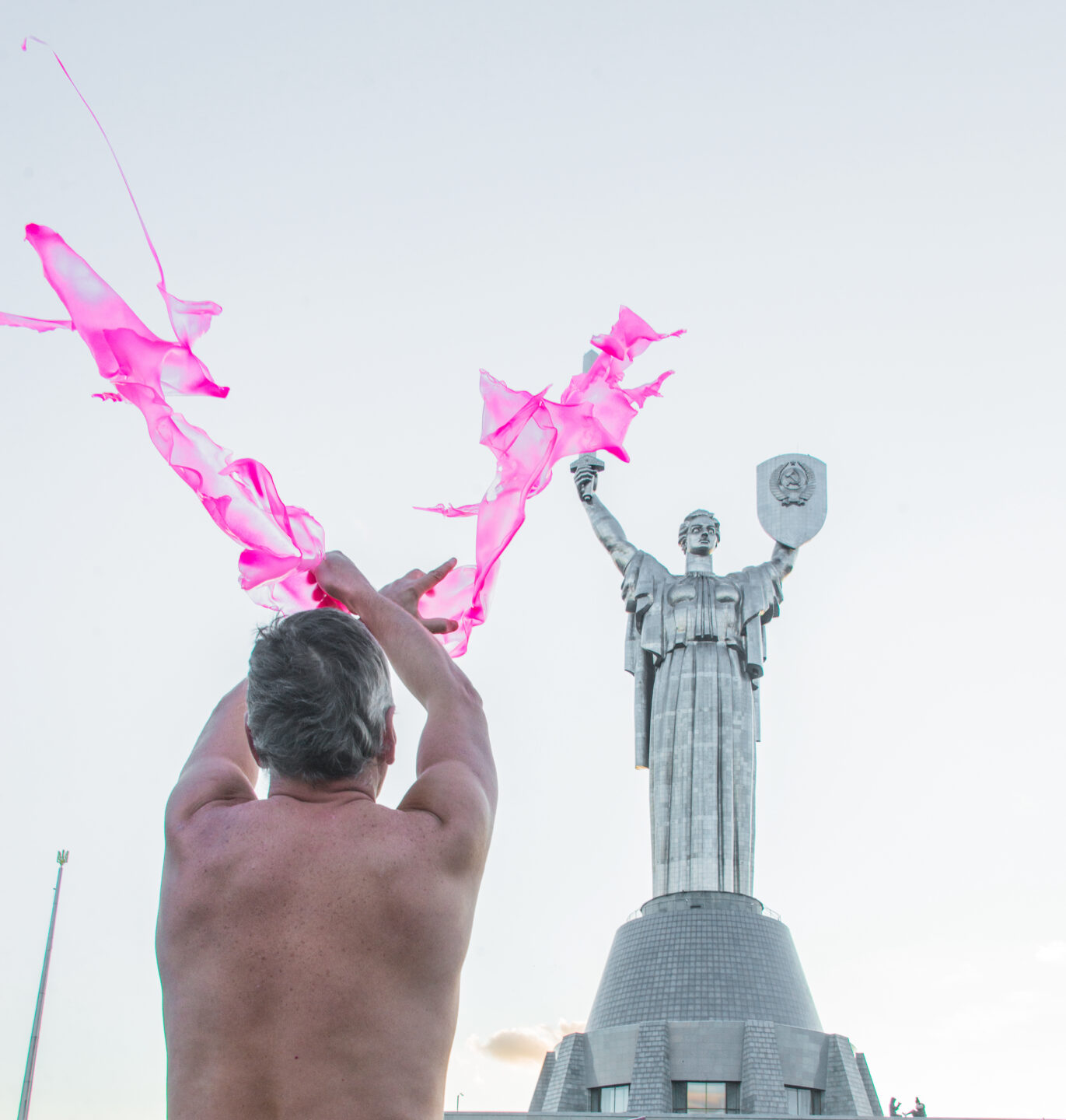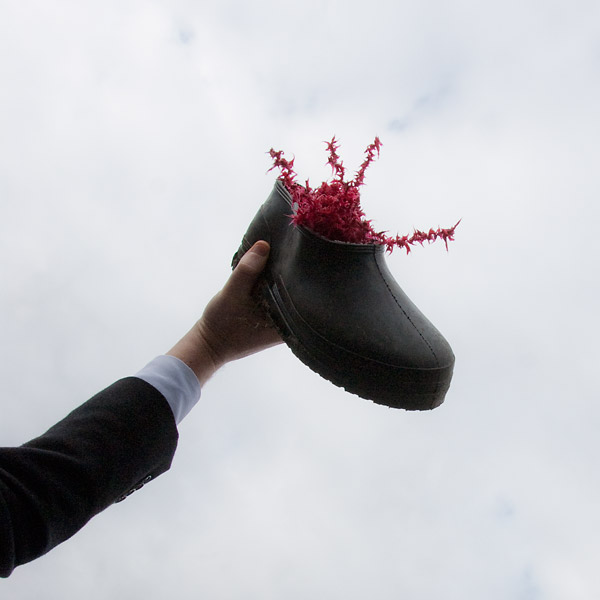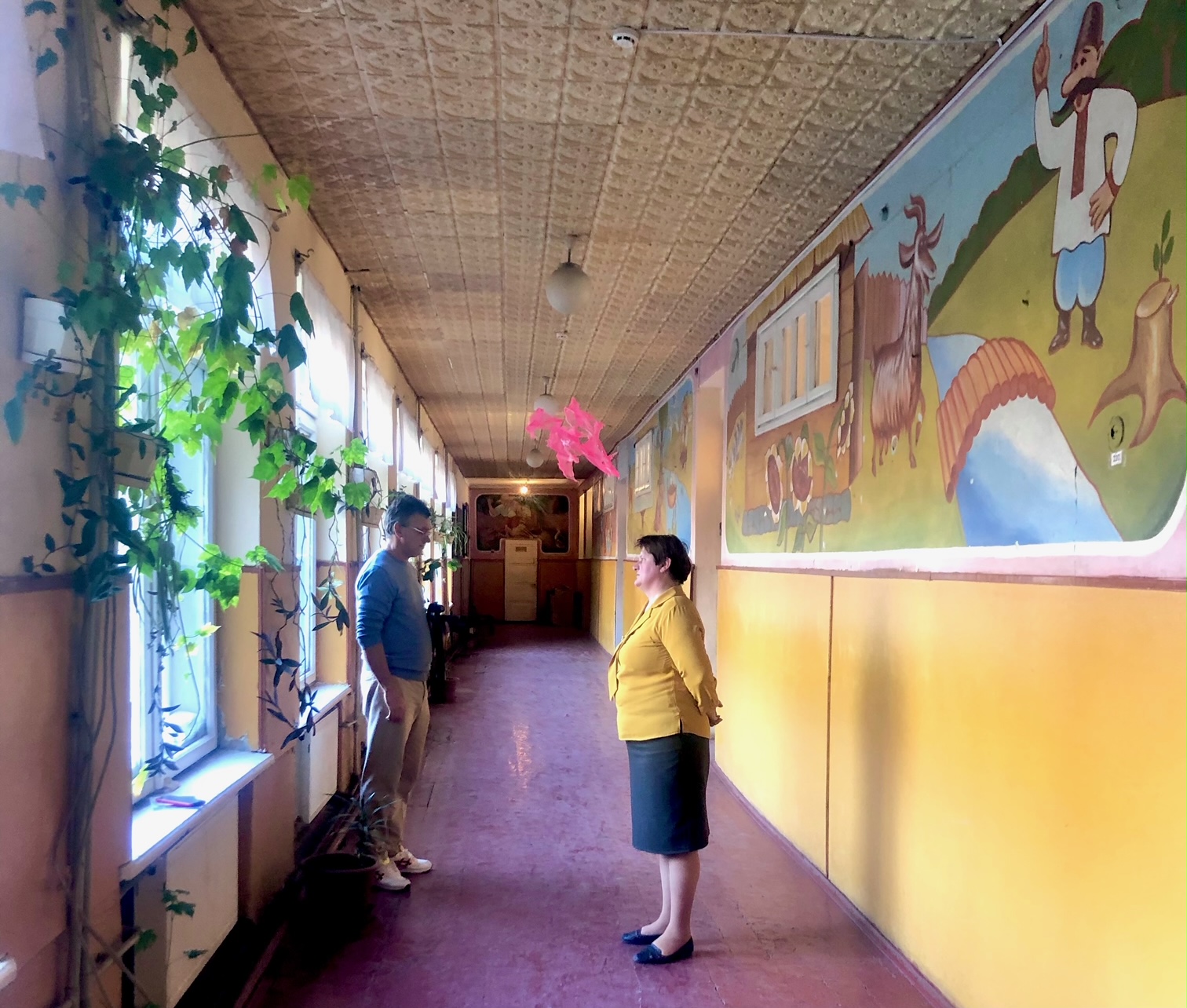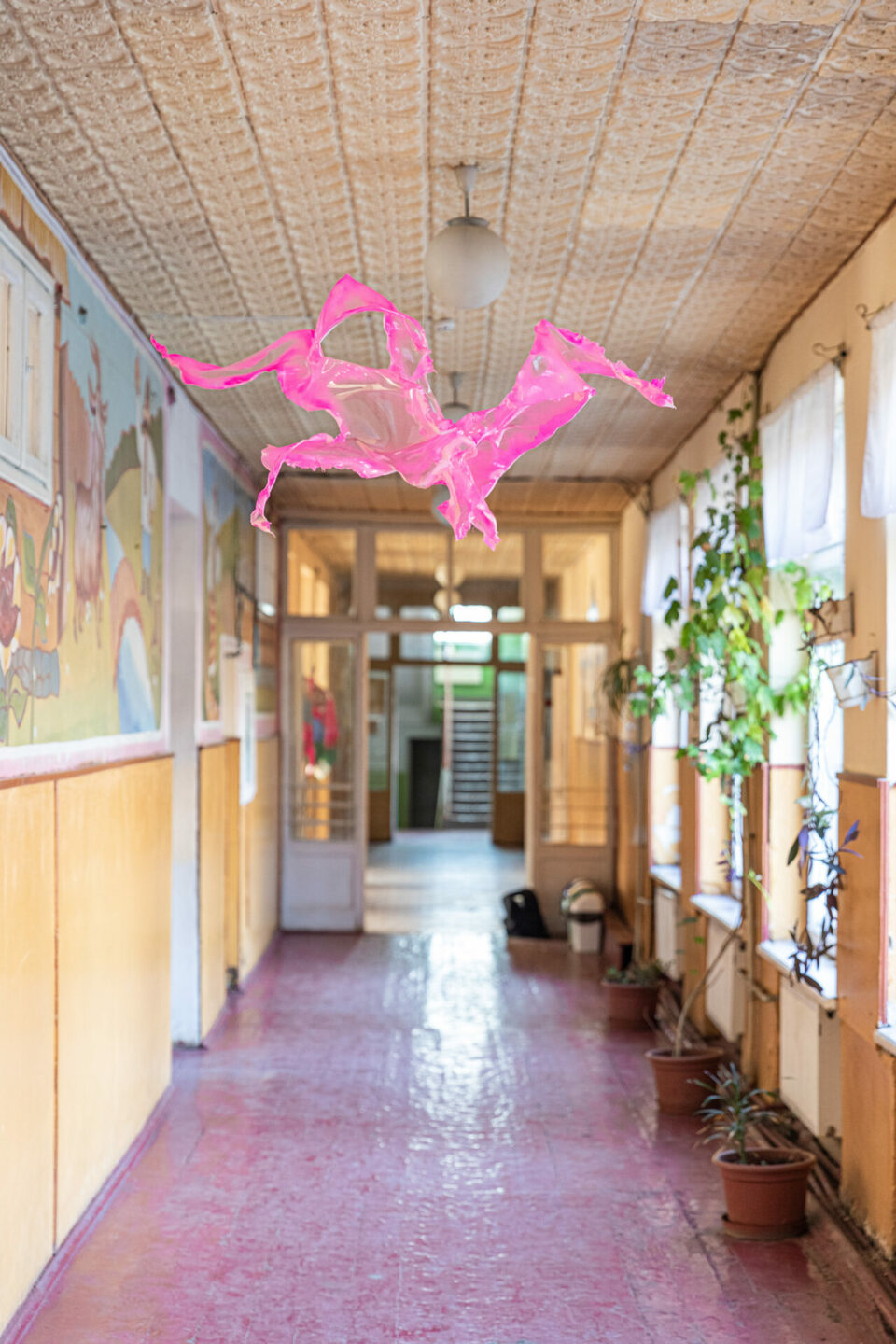Ukrainian-Russian Artist Aljoscha Talks War and Creation


Words: Chris Erik Thomas.
Against the backdrop of this towering statue, he held two pink forms he’d crafted days before. These forms were another of the Ukrainian-Russian artist’s “bios,” or sculptural objects that represent new forms of life. They are tied to the concepts of bioism and biofuturism that have guided the artist’s oeuvre. Over the years, these organic, almost alien forms have been seen in Spain, New York, Italy, Germany, Russia, and many other countries, but as he held them over his head in Ukraine, their message of life took on new meaning.
As he said in a statement on this intervention: “Bioism condemns any violence against humans, animals and plants. The suffering and war must be stopped! There are no justified conflicts, all of them are criminal, causing violence and pain to all kinds of biological beings. Any kind of human ideology is violent per se: as for instance blood thirsty motherland requires endless human sacrifices. Pacifism shall be extended to the peace and eudaimonia movement for all beings of this planet. As an European artist of Ukrainian-Russian origin, I stood naked and unprotected as animals and plants are in the silent protest against any kind of ideological madness. Stop insanity, seek for kindness!”
In the time since staging this intervention, Russia’s bloody, ruthless war on Ukraine has provoked international condemnation and set off a refugee crisis that has displaced nearly two million people. As the world struggles to understand what comes next, we called the Beck & Eggeling-represented artist as he sped along the Autobahn on his way home to Düsseldorf to hear his thoughts on the war in Ukraine, the lessons of a childhood spent in the Soviet Union, and why, despite everything, he’s hopeful that “cruelty will not succeed.”
You were in Kyiv from the 21st until the 23rd, and the Russian invasion began the next day on the 24th. What was the mood like in Kyiv when you were there?
The mood was totally relaxed. People were not scared of anything. It was business as usual everywhere. On the street, I met a CNN reporter asking people what they thought about Putin’s announcement [recognizing the independence of separatist regions in eastern Ukraine]. It was the 21st of February when he made those dreadful warnings. The reporter was asking everybody, “What do you think about it?” They were thinking nothing. They asked me, too, and I said, “Well, I don’t care that much, because I neglect any kind of ideology, and what he says is just sick ideas,” and so on. Well, it wasn’t.
When I landed in Kyiv on the 21st, the first thing [I did] was I asked my brother, who picked me up at the airport, that we drive together to buy all the things I needed to create new objects. I felt that this had to be done immediately. I created these two pieces [for the intervention] three or four hours after landing, which for me are like live beings. With these two pieces, I went the next day to this huge militaristic monument, [the Motherland Monument]. I felt, personally, that things could get dangerous. There was so much militaristic power. So much destructive potential.
The Motherland Monument is one of the only remaining large-scale monuments to the Soviet Communist era. What made you choose that statue?
It can be seen almost from everywhere at any point in Kyiv. Everyone in the middle of Kyiv can see this huge, huge mother, which is always, in my opinion, bloodthirsty. It represents this militaristic ideology of the Russian state. The state is above everything; it is above every single person and above any kind of private humanity. It always needs sacrifices from the citizens of Russia. They say they should be ready at any time of their life to sacrifice their lives for this mother, and it is exactly what happens now. The ideology of Putin’s regime is misusing this idea to justify [their actions]. They justify any kind of violence with it. They justify any kind of retaliation and cruelty with it.

Aljoscha. "Bioism condemns any violence against humans, animals and plants. The suffering and war must be stopped." Kyiv, Ukrain. Feb 22, 2022. Courtesy Aljoscha.
Can you talk a bit about the ideologies that were around you growing up?
I was born in 1974, which means I was born in the Soviet Union. The “motherland” idea was implemented in the education of all people who grew up in the Soviet Union. My father is Russian and my mother is Ukrainian. I had to learn the Ukrainian language in school, but as I grew up in East Ukraine, there was almost no one in real life who spoke the Ukrainian language. When the Soviet Union broke apart, national states emerged from one day to another in the ’90s. But then those national states mutated into, in my eyes, feudalistic states or oligarchic states.
Of course, this national ideology can come from any of those states. It doesn’t matter if it’s Ukraine, Russia, Kazakhstan, Latvia, Lithuanian, Estonia, Georgia, Tajikistan, Uzbekistan, it doesn’t matter. The oligarchs misuse those nationalistic ideas to protect their states. Now Putin misuses these kinds of self-made conflicts and he justifies his aggressive politics. It’s a very sad situation.
Where did your urge to create art begin?
I liked to draw a lot and, even now, it’s the best meditation for me. I always draw very small, tiny, microscopic things, therefore my drawings are never too big. I’ve done it from my early childhood till now. Of course, with those drawings, you cannot be successful. People don’t collect paper. They cannot understand how you can spend one month of work on one small piece of paper. You cannot sell those. You cannot persuade normal people with such artworks. Therefore, I do bigger, large things, but this is my private refuge.

Aljoscha. "Twin bioism creatures are at the maidan in Kyiv." Maidan Nezalezhnosti, Kyiv, Ukraine. Feb 18-20, 2014. Courtesy Aljoscha.
As long as we can not treat any kind of living being properly, we can not treat ourselves properly.
Your art is tied into this concept of bioism or biofuturism that condemns violence against humans, animals, and plants. When did you discover this concept and begin tying it into your work?
I have been very, very fond of nature and biology since my childhood. We, as humans, normally do not like to understand that we are living in a totally biological environment. Even in these COVID times, as we have seen how fragile we are just from the virus, we don’t speak about how much we are influenced by nature and how much influence we can put on the biosphere around us.
In my statement for this intervention in Kyiv, I tried to implement this idea that until we can respect biology around us – the clouds, the biosphere – until that time, we can not respect ourselves. As long as we can not treat any kind of living being properly, we can not treat ourselves properly. We should attack this problem at the root and we don’t do it. We try to find simple solutions for very complex things. We have to change our minds.
Your art presents a pretty hopeful vision for the future. How do you maintain that? Do you have hope that things can change?
Yes. I’m a very optimistic person. One thing that makes me positive and optimistic is that biology is very, very powerful. Even if humans, as a biological form, will not succeed, biology will develop another species that will be more superior than us, which will be more successful. I strongly believe in this. Evolution is unstoppable. What we do not like to understand is that the motor of evolution is diversity; diversity in terms of mutations.
Any kind of biological being in our world – you, me, the cat on the street – they’re successors of those mutations. We are successors of deviations, but our ideology for any kind of society or any kind of civil organization does not like deviation. Mutations and deviations are something that we condemn, that we always treat as mistakes.
This is a problem that should be solved, and therefore bioism and bioethics are for improving those things. Bioism is for biological complexity and multiplicity. Bioethics is for deviations and for happiness for every kind of living being. We should live happily and to do so, we have to accept how diverse biology is. How complicated things are. Mutations are actually a blessing, not a kind of cursed thing. We are alive because of the change.

Aljoscha. “In Ukrainian school Internat with over 250 refugees”, March 23, 2022. Courtesy Aljoscha.

Aljoscha. “In Ukrainian school Internat with over 250 refugees”, March 23, 2022. Courtesy Aljoscha.
What are you hoping will result from this war on Ukraine?
This conflict will not change that much immediately, but we live in a totally new time. We have raw information all around us and information is easily multiplied, transferred, spread, and shared. All those cruel things are spreading around the world immediately and they are causing us to rethink. Cruelty will not succeed.
Chris Erik Thomas is the Digital Editor of Art Düsseldorf. They work as a freelance writer and editor in Berlin and focus primarily on culture, art, and media. Their work can also be seen in Highsnobiety, The Face Magazine, and other publications.